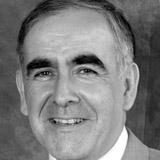 “Le frime” is an almost untranslatable French word for doing something that seems superfluous for the fun of it. It is as good a term as any for the opening ceremonies of our European Union Geriatric Medicine Society conferences. These reflect how individual nations put their best foot forward for guests. While the content may at first sight seem to be tangential to the core business of geriatric medicine, linkages appear with reflection.
“Le frime” is an almost untranslatable French word for doing something that seems superfluous for the fun of it. It is as good a term as any for the opening ceremonies of our European Union Geriatric Medicine Society conferences. These reflect how individual nations put their best foot forward for guests. While the content may at first sight seem to be tangential to the core business of geriatric medicine, linkages appear with reflection.
And so it was in Rotterdam last week, with a line up including an astronaut/physician, the city organist, a retired Dutch prime minister, and silent movies (old and new). The setting was the magnificent De Doelen concert hall, in a futuristic city centre with an iconic and dramatic train station that opened this year.
The presentation from Dr André Kuipers was witty, entertaining, and informative. Space medicine offers insights into accelerated forms of ageing syndromes, particularly osteoporosis and sarcopaenia; the responses, particularly through exercise, were very relevant to the science of geriatric medicine.
A thought provoking aside was the challenge of executing CPR in a gravity free environment—stable purchase for chest compression is provided by pressing one’s feet against the ceiling of the space station.
The Dutch Geriatric Medicine Society has been successful in engaging retired and respected politicians onto their advisory board, and the address by Wim Kok, a retired Dutch prime minister who is now 75 years old, was impressive. His perception that geriatric medicine was now central to the care of older people was encouraging.
His quip that he hoped not to need our services spoke to a wish not to fall ill: the icing would have been on the cake if he had said that he would like to be treated by a geriatrician when illness eventually arrives!
The intervention of the city organist was initially as accompanist to Méliès’ silent film A Trip to the Moon (a link to the space theme). This was followed by a modern silent movie, which he also accompanied, allowing the audience to focus on his remarkable skills when playing.
If it’s not stretching an allusion too far, a consensus over drinks at the reception was that organ playing had resonances with the practice of geriatric medicine. What we learned in internal medicine was like playing the piano with two hands and one keyboard: in geriatric medicine, juggling the many facets and complexities of ageing, relatives, and psychosocial aspects means that we now add the feet, keyboards, stops, and registers.
The conference proper grows in strength from year to year. Some complain of the frustration of multiple parallel sessions, but I see this as a sign of strength and growth, as long as one resists the urge to switch during sessions—the timings never mesh neatly.
The standard of the presentations was high, and debate lively. One particular concern was the likelihood of watered down rehabilitation in nursing home and community hospital settings. It is likely that younger patients with significant rehabilitation needs are not admitted to these settings across Europe, and would instead be under the care of a trained rehabilitationist with more intensive care, raising the spectre of an ageist compromise. Unfortunately, such care appears cheaper to governments, although studies suggest that this is not the case in the long run.
An encounter with euthanasia at a Dutch congress was to be expected. What was truly fascinating was the absence of the topic in the submitted scientific presentations, either oral or poster. This would suggest that even in Holland the issue is neither central to, nor resonant with, the practice of geriatric medicine, a speciality which tends to respond positively and supportively to the stigma of frailty and dementia.
A fairly comprehensive overview of the Dutch experience was provided in a seminar by Prof Hans van Delden, a noted ethicist and researcher on euthanasia. The dispassionate tone, and a somewhat smug pride in the perception of Dutch frankness relative to obfuscation by other nations, reminded me of the tone of Bert Keizer’s Dancing with Mister D, a harsh look at life and death in Dutch nursing homes.
A neat counterpoint to his talk was provided by screenings of an otherwise inspiring Dutch movie about dementia, where we see relatives trying to persuade a reluctant person with dementia to set a point of severity of dementia at which euthanasia would be invoked.
The UK contribution to the congress was notable, particularly from Nottingham, one of the academic powerhouses of British geriatric medicine. Indeed, a Nottingham medical student presented my favourite poster, exploring the impact of participating in the Notts County Football in the Community group for men with early onset dementia, an inspired idea.
If you are looking for a high quality geriatric medicine congress next year with a friendly atmosphere, the next EUGMS Congress is in Oslo in September 2015. The Norwegian approach to the opening ceremony is keenly anticipated.
Desmond (Des) O’Neill is a geriatrician and cultural gerontologist in Dublin. He is also the local lead for the IAGG-ER Congress in 2015.